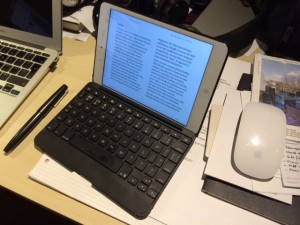So it begins. The next steps by the National Security state to ensure that nobody has the right to private communications or data.
FBI Director James Comey on Thursday said he’s bothered by moves by Apple Inc. and Google Inc. to market privacy innovations on smartphones that put some data out of the reach of police, saying agency officials have been in touch with both companies.
“What concerns me about this is companies marketing something expressly to allow people to place themselves beyond the law,” Mr. Comey said in a briefing with reporters, reports WSJ’s Brent Kendall.
Mr. Comey said he still wants to get a better handle on the implications of the technology, saying FBI officials have engaged in discussions with the companies “to understand what they’re thinking and why they think it makes sense.”
As WSJ earlier reported, officials in Washington have been expecting a confrontation with Silicon Valley in the wake of Apple’s announcement that its new operating system for phones would prevent law enforcement from retrieving data stored on a locked phone, such as photos, videos and contacts. Google has also said its next version of its Android mobile-operating system this fall would come with similar privacy protections.
This is where the mantra “if you’ve nothing to hide then you’ve nothing to fear” gets us.
And then there’s this from Down Under:
This week, Australian Prime Minister Tony Abbott used recent terrorist threats as the backdrop of a dire warning to Australians that “for some time to come, the delicate balance between freedom and security may have to shift. There may be more restrictions on some, so that there can be more protection for others.”
This pronouncement came as two of a series of three bills effecting that erosion of freedoms made their way through Australia’s Federal Parliament. These were the second reading of a National Security Amendment Bill which grants new surveillance powers to Australia’s spy agency, ASIO, and the first reading of a Counter-Terrorism Legislation Amendment (Foreign Fighters) Bill that outlaws speech seen as “advocating terrorism”. A third bill on mandatory data retention is expected to be be introduced by the end of the year.
Whilst all three bills in this suite raise separate concerns, the most immediate concern—because the bill in question could be passed this week—is the National Security Amendment Bill. Introduced into Parliament on 16 July, it endured robust criticism during public hearings last month that led into an advisory report released last week. Nevertheless the bill was introduced into the Senate this Tuesday with the provisions of most concern still intact.
In simple terms, the bill allows law enforcement agencies to obtain a warrant to access data from a computer—so far, so good. But it redefines “a computer” to mean not only “one or more computers” but also “one or more computer networks”. Since the Internet itself is nothing but a large network of computer networks, it seems difficult to avoid the conclusion that the bill may stealthily allow the spy agency to surveil the entire Internet with a single warrant.
Apart from allowing the surveillance of entire computer networks, the bill also allows “the addition, deletion or alteration of data” stored on a computer, provided only that this would not “materially interfere with, interrupt or obstruct a communication in transit or the lawful use by other persons of a computer unless … necessary to do one or more of the things specified in the warrant”. Given the broad definition of “computer”, this provision is broad enough to authorize website blocking or manipulation, and even the insertion of malware into networks targeted by the warrant.
Capping all this off, the bill also imposes a sentence of up to ten years imprisonment upon a person who “discloses information … [that] relates to a special intelligence operation”. Although obviously intended to throw the hammer at whistleblowers, the provision would apply equally to journalists. Such a provision could make it impossible for Australians to learn about the activities of their own government that infringe international human rights laws.





